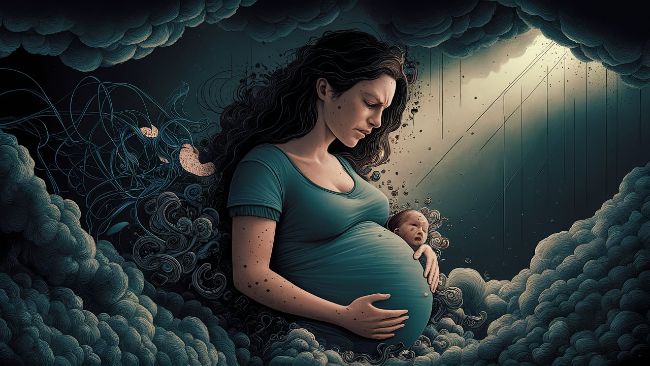In the quiet, lonely hours of the night, when the world is asleep, your mind might feel like it’s running a terrifying marathon. You’ve read about postpartum depression and anxiety, but what you’re experiencing feels different. More intense. More frightening.
Maybe you’re a new mother whose thoughts have become strange and confusing. Or perhaps you’re a concerned partner or family member, watching a woman you love behave in ways that are completely out of character—agitated, paranoid, or saying things that don’t make sense.
You are scared, and you are right to be. You may be encountering a rare but life-threatening condition called Postpartum Psychosis (PP).
This article is your guide. Its purpose is not to frighten you, but to arm you with clear, life-saving information. We will explain what Postpartum Psychosis is, how it is fundamentally different from depression, how to recognize the signs, and—most importantly—what to do right now.
Let us be clear from the very beginning: Postpartum Psychosis is a medical emergency. Understanding the information here and acting on it quickly can save lives.
First, A Critical Clarification: Psychosis is NOT Severe Depression
One of the biggest sources of confusion is the terminology. You may have heard terms like “postnatal depression psychosis” or assumed that psychosis is just a very severe form of postpartum depression (PPD). This is incorrect and a dangerous misunderstanding.
- Postpartum Depression (PPD) is a mood disorder. It is characterized by severe sadness, hopelessness, and loss of pleasure.
- Postpartum Psychosis (PP) is a psychotic illness. It is characterized by a break with reality, where the individual experiences delusions, hallucinations, and disorganized thinking.
While a person with PP can (and often does) have symptoms of depression or mania, the defining feature of psychosis is the loss of insight. The person experiencing it does not realize that their thoughts and perceptions are not real. This is why it is so dangerous.
The Crucial Difference: Psychosis vs. Intrusive Thoughts vs. PPD
For many new mothers, the scariest part of postpartum mental illness is the thoughts. So how can you tell the difference between the three? This table is critical for understanding what you or a loved one might be experiencing.
| Feature | Postpartum Depression/Anxiety | Intrusive Thoughts (PPA/OCD) | Postpartum Psychosis (PP) |
|---|---|---|---|
| Core Experience | Overwhelming sadness, worry, or numbness. | Unwanted, horrifying thoughts or images that cause extreme distress. | Loss of contact with reality. Believing things that are not true. |
| The “Scary Thought” | Thought: “I’m a bad mother, my baby would be better off without me.” Emotion: Despair, guilt. | Thought: An unwanted, terrifying image of harming the baby flashes into your mind. Emotion: Horror, panic, fear of the thought itself. | Thought: “My baby is a demon and I need to exorcise it.” Emotion: Belief, conviction, a sense of purpose. |
| Insight (Awareness) | You know you are depressed or anxious. You feel “off.” | You know the thought is just a thought. It is NOT what you want to do. The thought is alien and deeply upsetting to you. | You have lost insight. You believe the delusion or hallucination is real. You do not think you are sick; you may think others are the problem. |
| Risk of Harm | Risk of self-harm due to despair. Risk to baby is primarily from neglect due to incapacitation (not malice). | Extremely low risk. Mothers with intrusive thoughts are often obsessively protective because they are so horrified by their own thoughts. | HIGH RISK. The risk of suicide and infanticide is significant because the person is acting on a delusional belief system they perceive as reality. |
| Urgency | Urgent. Requires professional help as soon as possible. | Urgent. Requires specialized therapy to manage distress. | A MEDICAL EMERGENCY. Requires IMMEDIATE hospitalization. |
[Use the WordPress “Table” block for this. It is one of the most important sections of the article.]
Recognizing the Warning Signs: Symptoms of Postpartum Psychosis
Postpartum Psychosis happens to approximately 1 to 2 in every 1,000 mothers, making it rare. It often begins very suddenly, typically within the first two weeks after delivery. The symptoms can change rapidly, even within the same day.
Here are the key symptoms to watch for.
1. Delusions (Strange or Irrational Beliefs)
Delusions are firmly held false beliefs that are not part of the person’s culture or religion. In PP, they are often focused on the baby.
- Grandiose Delusions: Believing she has special powers, or that the baby is a divine being (like Jesus) or royalty.
- Paranoid Delusions: Believing that people are plotting against her, trying to poison her, or harm or steal her baby. This can cause her to be extremely suspicious, even of close family.
- Other Delusions: Believing she is being sent secret messages through the TV, or that she is responsible for a disaster. A common and dangerous delusion is a belief that the baby is demonic or evil and must be “saved” or destroyed.
2. Hallucinations (Sensing Things That Aren’t There)

Hallucinations are sensory experiences without an external source.
- Auditory Hallucinations: Hearing voices is the most common type. The voices might comment on her behavior, argue with each other, or give commands (known as “command hallucinations”), which can be extremely dangerous.
- Visual Hallucinations: Seeing things that aren’t there, like shadows, people, or insects.
3. Disorganized Thinking and Speech
The person’s thoughts and speech may become confused, jumbled, and hard to follow.
- Jumping rapidly from one unrelated topic to another.
- Speech that is so fast, jumbled, or illogical that it’s impossible to understand.
- Suddenly stopping in the middle of a sentence.
4. Extreme and Rapid Mood Swings
The person’s mood can swing from one extreme to another very quickly.
- Mania/Euphoria: Feeling “on top of the world,” having boundless energy, talking very fast, needing little to no sleep for days.
- Severe Depression: Expressing feelings of hopelessness, despair, and worthlessness.
- Agitation and Irritability: Feeling intensely restless, angry, and unable to sit still.
5. Bizarre Behavior and Confusion
The person may act in ways that are completely out of character.
- Pacing frantically, being unable to rest.
- Behaving in a highly disorganized or confused manner.
- Displaying paranoia, such as refusing to eat food for fear it’s poisoned.
Who Is at Risk? This is Not Your Fault.
It must be said again: Postpartum Psychosis is not caused by anything a mother did or did not do. It is a severe biological illness. The single biggest risk factor is a personal or family history of specific mental health conditions.
- Bipolar Disorder: The strongest predictor. Up to 50% of women with bipolar disorder may experience a postpartum psychosis episode if unmanaged.
- Schizoaffective Disorder or Schizophrenia: A personal history also significantly increases risk.
- A Previous Episode of Postpartum Psychosis: If a woman has had PP once, her risk of having it again in a subsequent pregnancy is as high as 50%.
For many women, a PP episode is the very first time they are diagnosed with an underlying condition like bipolar disorder. The immense hormonal shifts and sleep deprivation of childbirth act as powerful triggers on a pre-existing biological vulnerability.
[Insert an image representing biology or brain chemistry, like a simple, abstract graphic of neural pathways.]
THIS IS A MEDICAL EMERGENCY: WHAT TO DO RIGHT NOW
If you believe you are experiencing symptoms of psychosis, or if you suspect a loved one is, you must act immediately. The person’s life and their baby’s life may be at risk. They cannot “snap out of it.” They have lost the ability to reason.
1. DO NOT LEAVE THE MOTHER ALONE. And do not leave her alone with the baby, under any circumstances.
2. CALL FOR IMMEDIATE HELP.
* Call 911 (or your local emergency services number) and clearly state, “I am with a new mother who I believe is experiencing postpartum psychosis. This is a psychiatric emergency.”
* Take her to the nearest hospital emergency room immediately.3. REMOVE THE BABY TO A SAFE PLACE. You can say something calm and simple like, “I’m going to hold the baby for a while so you can rest.”
4. COMMUNICATE CALMLY AND SIMPLY.
* DO NOT argue with the delusions or try to reason them away. This will only increase their agitation and paranoia.
* DO NOT yell, threaten, or criticize.
* DO speak in a calm, quiet voice.
* DO say things like, “I can see you’re very scared. I’m here to help you.” “We’re going to get you some help.” “You are safe.”For partners and family: You are the first line of defense. She may not recognize she is ill. You must be the one to act.
[Use a “Cover” or “Columns” block for this section. Give it a red or bright yellow background. Use large, bold font. This needs to be the most visually arresting part of the page.]
The Path to Recovery: Treatment and Hope
While Postpartum Psychosis is terrifying, the good news is that it is absolutely treatable and most women make a full recovery. The goal of treatment is to stabilize the mother and ensure her safety and the safety of her baby.
- Hospitalization: Inpatient care in a psychiatric unit is almost always necessary. This provides a safe, supervised environment where treatment can begin. Ideally, this would be in a specialized mother-baby unit (MBU) where the mother can stay with her baby, but these are rare.
- Medication: A combination of medications is typically used to stabilize mood and resolve psychotic symptoms. This may include mood stabilizers, antipsychotics, and antidepressants.
- Electroconvulsive Therapy (ECT): While it has a frightening reputation, modern ECT is a safe, painless, and highly effective treatment for severe psychosis and depression, especially when a rapid response is needed. It is often a first-line treatment for PP.
- Therapy: Once the psychosis has resolved, psychotherapy (like CBT) is crucial. It helps the mother process the trauma of the experience, address any underlying depression or anxiety, and rebuild her confidence as a parent.
A Story of Recovery
“I was convinced my son was a prophet and that men in black cars were watching our house to take him. My husband found me trying to ‘barricade’ the nursery door with laundry baskets. He says my eyes were ‘gone.’ I don’t remember much of the ER, just flashes. But I remember waking up in the hospital a few days later and the confusion was… quieter. The recovery was slow. There was so much shame and grief for the time I lost. But the doctors, my therapist, and my husband never gave up on me. Today, my son is a happy 5-year-old, and I am a healthy, stable mom. The psychosis was a terrifying chapter, but it wasn’t the whole story.”
— Anonymous survivor of PP

Frequently Asked Questions (FAQ)
Q1: Can you fully recover from Postpartum Psychosis?
Yes. With proper and immediate treatment, the prognosis for Postpartum Psychosis is very good. The vast majority of women go on to make a full recovery and do not have further psychotic episodes (unless they have an underlying chronic illness like bipolar disorder).
Q2: Does having Postpartum Psychosis mean I’m a bad or unloving mother?
Absolutely not. PP is a severe medical illness, just like sepsis or a heart attack. It has nothing to do with your character, your strength, or your love for your child. Your thoughts and actions during the episode were a result of the illness, not you.
Q3: If I had PP once, can I have more children?
This is a very personal decision to be made with your partner and a medical team. The risk of recurrence is high (up to 50%), but it is manageable. A psychiatrist specializing in perinatal health can create a proactive treatment plan for a future pregnancy, often involving medication from the moment of delivery, to dramatically reduce the risk of another episode.
Q4: I have scary thoughts about hurting my baby, but I know they are wrong and they horrify me. Is this psychosis?
No, this does not sound like psychosis. This sounds like the classic intrusive thoughts associated with Postpartum Anxiety or OCD. The key difference is your reaction: you are horrified and know the thought is wrong. This is a sign of anxiety, not a break with reality. Please see a therapist, as this is also highly treatable, but it is not the same emergency as psychosis.
The Storm Will Pass
Postpartum Psychosis is one of the most frightening things a family can endure. It steals a precious time and replaces it with confusion and fear.
But the storm does pass.
This illness is a thief, but it does not have to win. With immediate intervention, compassionate medical care, and strong support, the clouds will part. The woman you know and love will return. The bond with her child, though it may feel broken, can be healed and rebuilt.
If you are reading this in fear, take a deep breath. You have the information. Now is the time for courage. Now is the time to act. Make the call. Go to the hospital. You are starting a journey that ends in recovery.
